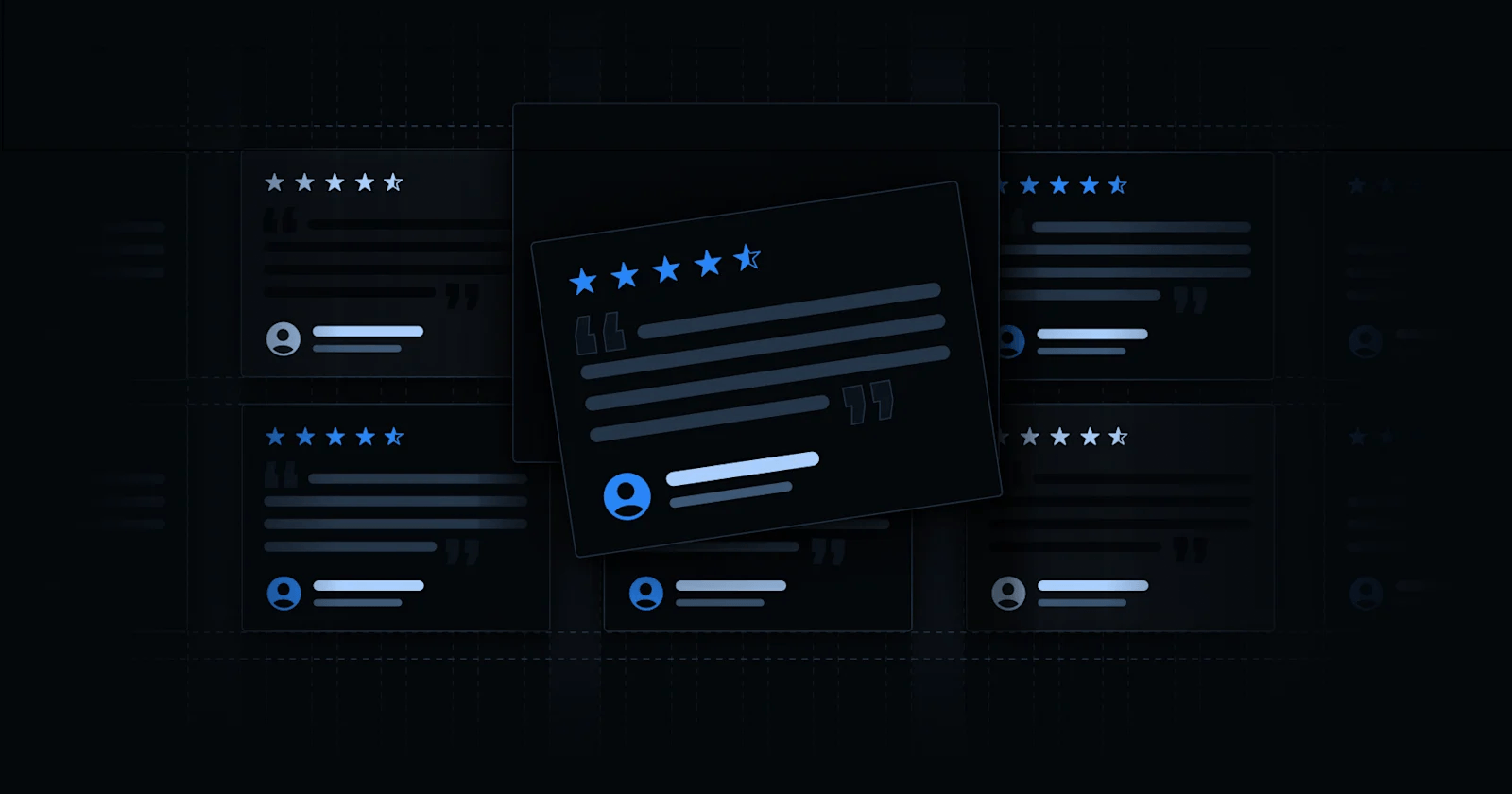When someone lands on your website, they’re asking themselves one thing: can I trust this company? Trust signals are how you answer that question.
Whether it’s a recognizable logo, client testimonial, or a secure checkout badge, trust signals show visitors they’re in the right place.
These small details reduce doubt and move people closer to taking action such as booking a demo or filling out a form.
In this article, we’ll break down what trust signals are, why they matter for B2B websites, and how to use them to build credibility and drive conversions.

Key Takeaways
- Trust signals help people feel confident in your brand. They reduce friction and hesitation during the buyer’s journey.
- They come in many forms, like social proof, security badges, partnerships, and clean design.
- You don’t need to overdo it. A few trust signals can go a long way, especially when they match what your audience actually cares about.
- Test and refine. Like anything on your site, trust signals should be part of your CRO strategy.
What Are Trust Signals?
Trust signals are visual and textual cues designed to build confidence in your brand and reassure visitors that your business is credible and reliable. In a B2B context, trust signals validate your expertise, establish your authority in the industry, and provide assurance that you are a trustworthy partner.
Whether it’s through client testimonials, industry certifications, or data security badges, these signals address any skepticism.
How Trust Signals Influence User Behavior
Trust signals play a key role in how users interact with your website. From the moment someone lands on a page, they’re looking for cues that tell them your business is credible and reliable.
If those signals are missing (no testimonials, outdated design, unclear messaging) users may hesitate or leave altogether.
But when trust signals are present and visible, they create a sense of security. Visitors feel more confident engaging with your brand and are more likely to take meaningful action.
Trust signals reduce friction in the decision-making process. They build confidence in your offering, reinforce your authority, and help guide users toward conversion.
8 Essential Trust Signals for Every Website
Building trust is one of the most important things your website can do. And that trust doesn’t come from a single element. It’s earned through a mix of signals that show visitors your company is credible and reliable.
1. Design for Clarity and Speed
A cluttered, slow site erodes trust quickly.
Clean layouts, fast performance, and logical navigation show visitors that your company is organized and easy to work with.
B2B buyers want answers fast. If they can’t find what they need, they’ll move on. Clear CTAs, readable content, and a frictionless experience signal that you respect their time.
2. Use Trust Bars
Trust bars, such as money-back guarantees, secure checkout icons, or data privacy badges, act as visual shorthand for safety.
Place them near key conversion points like forms or pricing sections, where buyers might feel the most hesitation.
3. Testimonials and Reviews
Real testimonials and reviews offer proof that others have seen success with your product or service.
Include names, job titles, and logos when possible to add credibility. For B2B companies, video testimonials or longer-form success stories work especially well for high-consideration decisions.
You can even ask existing customers to fill out review forms to gather positive reviews to share with potential customers.
4. Highlight Results
Numbers speak louder than adjectives. Share stats that show the impact you’ve had. Include revenue growth, time saved, conversion lifts, or user adoption rates. When buyers see proof that you’ve delivered results, it’s easier to trust that you’ll do the same for them.
5. Accreditations and Awards
If you’ve earned industry certifications, awards, or belong to trusted associations, show them off. These third-party endorsements back up your credibility and position you as a serious player in your space.
6. Security Certifications
B2B buyers are especially cautious about data security.
SSL certificates, HTTPS, and compliance badges like SOC 2 or GDPR important trust signals to display on your site.
Make them visible, especially on login pages, checkout flows, or anywhere user data is shared.

6. Feature Credible Names
Featuring well-known clients, tech partners, or integration badges (like Salesforce, HubSpot, or AWS) shows that other reputable organizations trust you.
It’s an instant reputation boost—especially if those logos align with your buyer’s industry or tools they already use.
7. Add Team Visibility
For B2B buyers, knowing who they’ll be working with builds confidence.
Consider adding team bios, leadership photos, or even short videos from founders or subject-matter experts.
A human face behind the brand adds a layer of authenticity that automated emails can’t match.
8. Authoritative Content
In-depth, high-quality content builds trust over time.
You can publish detailed guides, research-backed blog posts, original data, and expert insights.
When buyers see that you understand their industry and challenges, they’re more likely to trust your solution. It also shows you're not just trying to sell, but you’re here to help.
6 Key Pages to Use Trust Signals
Trust signals work best when they’re placed where users are already looking for reassurance. These six pages offer the highest-impact opportunities to build credibility and guide visitors toward conversion.
1. Homepage
Your homepage is often the first interaction someone has with your brand. In just seconds, users form an opinion, so trust signals need to be immediate and visible. Focus on what builds credibility at a glance:
- Customer testimonials: Highlight real quotes from recognizable clients that speak to your results.
- Awards and recognitions: Showcase industry certifications, rankings, or third-party endorsements.
- Security and compliance badges: Add visual proof of GDPR, ISO, or other compliance to show you take data privacy seriously.
These elements create a strong first impression and give visitors a reason to explore further.
For inspiration, check out Webstacks' homepage. It features our clients' logos and links to client stories.
2. Product Pages
On your product pages, incorporate trust signals like detailed product descriptions and table comparisons, user reviews, and social proof to give potential customers confidence in your offerings and the buying process.
Trust signals here should reinforce product value and reduce risk:
- Detailed descriptions and comparisons: Use structured content and side-by-side tables to show how your solution stacks up.
- User reviews and testimonials: Feature specific feedback from customers who’ve solved similar challenges.
- Case studies and use Cases: Link to real-world examples that show how your product delivers outcomes.
3. Company/About Page
The company or about page is an excellent opportunity to share your brand's story and highlight trust signals like your team's expertise, industry partnerships, and company milestones. Key elements to include are:
- Team expertise: Showcase your leadership team’s experience, qualifications, and industry involvement. Providing bios or linking to relevant content (like articles or speaking engagements) is also a great idea.
- Industry partnerships and certifications: Display partnerships with respected industry organizations, certifications, and memberships that highlight your credibility and influence within your field.
- Company milestones and achievements: Share your growth story, including key milestones like expansion into new markets, product innovations, or notable client wins.
This page should leave visitors with a strong sense of your professionalism and authority.
4. Pricing Page
Your pricing page should include trust signals that reassure customers about the value of your products or services. Include:
- Money-back guarantees or trials: Reduce risk with offers that show confidence in your product.
- Client success stories: Place mini case studies near pricing options to reinforce ROI.
- Transparent pricing: Clearly outline what’s included, no surprises or vague language.
5. Customers Page / Case Studies
Dedicate a page to showcasing your satisfied customers and their success stories. This allows you to use social proof and demonstrate your ability to deliver results.
Walk readers through challenges your existing clients faced and how you solved them. We also recommend filtering or grouping stories by vertical so prospects see what applies to them.
6. Demo and Contact Pages
As visitors approach the final stages of their buyer's journey, use trust signals like security badges, contact information, and clear calls to action to instill confidence and encourage them to take the next step. On demo requests or contact pages, consider adding:
- Badges or text that indicate data privacy and security practices.
- Multiple ways to get in touch, such as phone numbers, email addresses, and live chat options.
- Use CTAs like “Schedule Your Free Consultation” or “Request a Demo” paired with reassuring language that highlights no obligations or a hassle-free process.
These trust signals provide the final nudge needed to convert hesitant prospects into leads.
How to Build Trust Through Social Proof
For B2B companies, trust is about both branding and proof.
Buyers need to see that others have already put their trust in your product or service and gotten results. Social proof helps you do just that.
Whether it’s a testimonial from a well-known client, a data-driven case study, or a shoutout on LinkedIn, social proof reduces uncertainty and validates your credibility.
Social proof demonstrates that real people, at real companies, have benefited from what you offer. For startups, this can help overcome the “unknown vendor” hurdle. For enterprise companies, it reinforces your track record at scale.
Here’s how to make social proof work harder on your site and across your marketing:
- Use named testimonials with context: Go beyond a quick quote. Include the customer’s full name, title, company logo, and the specific challenge they solved. This makes the feedback more believable and more relevant to other buyers.
- Leverage UGC from LinkedIn and Slack communities: Pull in authentic comments, screenshots, or public praise from real users in the tools and spaces your buyers already trust.
- Publish case studies with metrics: Highlight the before-and-after results your clients achieved, such as revenue growth, time savings, adoption rates.
- Feature industry experts or advisors: If you’ve worked with or been endorsed by credible names in your space, make that visible. For startups, this can bridge the gap between unfamiliarity and authority.
- Show client logos, but prioritize the story: A wall of logos helps but pairing those logos with short, focused stories makes the trust signal stronger.
- Incorporate social proof into CTAs: Instead of just “Request a Demo,” try “See why [Company X] chose us” or “Join 2,000+ teams already using [Product].”
B2B buyers are doing more research than ever and they trust their peers more than they trust your pitch. Strategic social proof meets them where they are and gives them the confidence to move forward.
How to Measure the Impact of Trust Signals
Trust signals only work if they’re actually influencing behavior. To understand what’s driving results, you need to track how users are interacting with these elements and whether they lead to action.
Start by identifying where trust signals appear on your site (homepage, pricing page, product pages, etc.), and measure what users do before and after they see them.
Here’s how to track their impact:
- Use heatmaps and scroll tracking to see whether users are noticing trust signals or scrolling past them. Look at hover data and scroll depth on testimonials, badges, logos, and case study blocks.
- Track conversion rates before and after placement to gauge whether adding a trust signal actually improves performance. For example, does adding client logos above a form increase demo requests?
- A/B test placement, design, and format to find what resonates. Test testimonials in a slider vs. a quote block, or see whether trust badges perform better near CTAs or in the footer.
- Monitor engagement on trust-focused elements like client logos, video testimonials, or certification badges. Use GA4 or event-based tools to track clicks or video plays.
- Segment by audience type or buyer stage to see which trust signals work best for different groups. For example, enterprise buyers may respond better to compliance badges or industry partnerships, while smaller teams look for social proof.
- Track post-conversion behavior to measure lead quality. If users who came through pages with strong trust signals convert faster or churn less, that’s a sign those elements are doing their job.
- Use personalization to adapt trust signals based on visitor type. Show industry-specific case studies, partner logos, or testimonials that match the visitor’s vertical, size, or stage in the funnel.
Measuring trust signals takes a bit of setup, but it gives you real data on what builds confidence.
Turn Trust Into Action
Trust signals are key to making your website feel credible, low-risk, and conversion-ready. When done right, they remove doubt and help buyers feel confident saying yes.
Whether you’re a startup looking to earn your first enterprise deal or a growing team trying to shorten the sales cycle, trust signals can make your brand feel like the safe bet.
If your site doesn’t reflect the quality of your product, it might be time to rethink how you're presenting your brand online. Check out how Webstacks helps B2B companies build brand trust through strategic design and messaging below:





